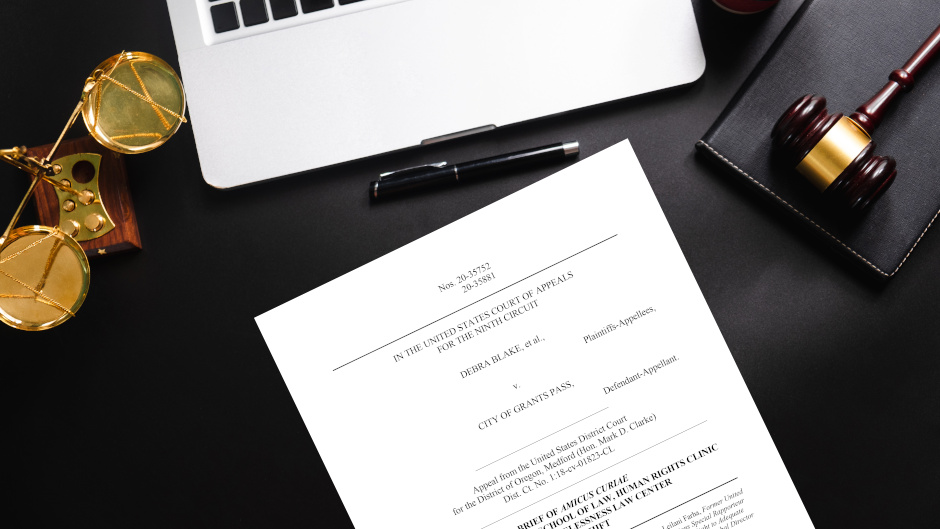Miami Law's Human Rights Clinic recently filed an amicus brief in the United States Court of Appeals for the Ninth Circuit in Blake v. City of Grants Pass, highlighting that punishing homelessness through the imposition of fines and fees for life-sustaining activities violates international human rights law. The plaintiffs, who were all people experiencing street homelessness, received 615 tickets for either sleeping or camping in public, despite the city not having any homeless shelters or emergency beds.
The clinic file the brief in partnership with the National Homelessness Law Center, the national legal group dedicated to ending and preventing homelessness, and The Shift, a global organization launched with the United Nations Office of the High Commissioner for Human Rights and United Cities and Local Governments, to secure the right to adequate housing. The Shift's global director Leilani Farha, is the former UN Special Rapporteur on the right to adequate housing. Four Miami Law students – 2L interns David Berris, Joseph Candelaria, Lily Fontenot, and 3L fellow David Stuzin – worked on the brief under the supervision of Professor Tamar Ezer, acting director of the Human Rights Clinic.
The brief asserts that punishing homelessness violates fundamental human rights. Specifically, human rights bodies have consistently established that criminalizing homelessness, including by imposing fines and fees, is a form of cruel, inhuman, and degrading treatment, which is analogous to the 8th Amendment's cruel and unusual punishment. The brief concludes by arguing that the U.S.'s failure to recognize the right to adequate housing is the root cause of the punishment of homelessness throughout the country.
"A human rights analysis is particularly critical when it comes to interpreting the prohibition against cruel and unusual punishment, which takes 'evolving standards of decency' into account. International human rights standards provide an important moral benchmark," said Ezer. "At the same time, preventing punishment for homelessness only scratches the surface. A real solution requires steps to enable access to adequate housing for all."
"The plaintiffs, in this case, were subjected to hundreds of tickets simply for living and sleeping in public spaces," said Fontenot. "The criminalization of homelessness is an unjust practice that must be stopped in the United States. Hopefully, our brief will help persuade the court that these practices are wrong and violate human rights."
The criminalization of homelessness refers to the laws and local ordinances that punish people experiencing homelessness for engaging in life-sustaining activities, such as sleeping, eating, or laying down. Local law enforcement continues to arrest and ticket individuals for living in public spaces, even when they have no other alternatives. The NHLC's Housing Not Handcuffs campaign is a national movement to end the criminalization of homelessness, advocating for access to affordable housing, education, health care, employment, income, and other services for people experiencing homelessness.
"Over the past 15 years, we have built up a clear and consistent record of condemnation of criminalization of homelessness by human rights bodies," said Eric Tars, legal director of the NHLC. "We've already seen its influence in federal policy, and now I'm so grateful to our partners at Miami's Human Rights Clinic for helping put it all together in this brief to hopefully make an impact in the courts, too."
Homelessness in Miami criminalized
Criminalization is also a problem in Miami. Miami-Dade County has four ordinances that criminalize life-sustaining behaviors that force individuals experiencing homelessness to perform in public: sleeping on public thruways; living or sleeping in vehicles; "aggressive or obstructive" panhandling; and public urination or defecation, despite the lack of public restrooms. Moreover, the City of Miami recently enacted an ordinance on large group feedings that criminalizes sharing food with people experiencing homelessness in public without a permit and at non-designated feeding locations.
"Researching and writing about the criminalization of homelessness has helped our team understand the burden placed on people experiencing homelessness who are punished just for finding a place to sleep, which is something we all take for granted. Having the opportunity, through our brief, to inform the court of the significance of their ruling on the human rights of people experiencing homelessness is something I am humbled to be a part of," said Berris.
The clinic's right to housing team has also worked on other advocacy for the decriminalization of poverty and homelessness. The clinic helped create the Poor Not Guilty Challenge. This virtual, interactive simulation highlights how fines and fees in the U.S. judicial system perpetuate the punishment of poverty, in collaboration with Professor Lien Tran of DePaul University, the NHLC, and the Fines and Fees Justice Center. Also, the clinic submitted a report on housing and homelessness for the Universal Periodic Review of the U.S. by the United Nations Human Rights Council, which it subsequently updated with factsheets on the intersection of homelessness with COVID-19, racial justice, and gender, including the experiences of women and the LGBTQ community.
"While the COVID-19 pandemic showed how access to housing is a life-or-death matter through the stay-at-home orders, it also showed that, with political will, the government has the capacity to protect people's right to adequate housing, as it did through hotel housing programs," said Candelaria.
To find out more about homelessness and the right to housing, please read the Human Rights Clinic's factsheets on housing and homelessness in Miami-Dade County and the human right to adequate housing, available both in English and Spanish.
Read more about Miami Law's Human Rights Clinic

